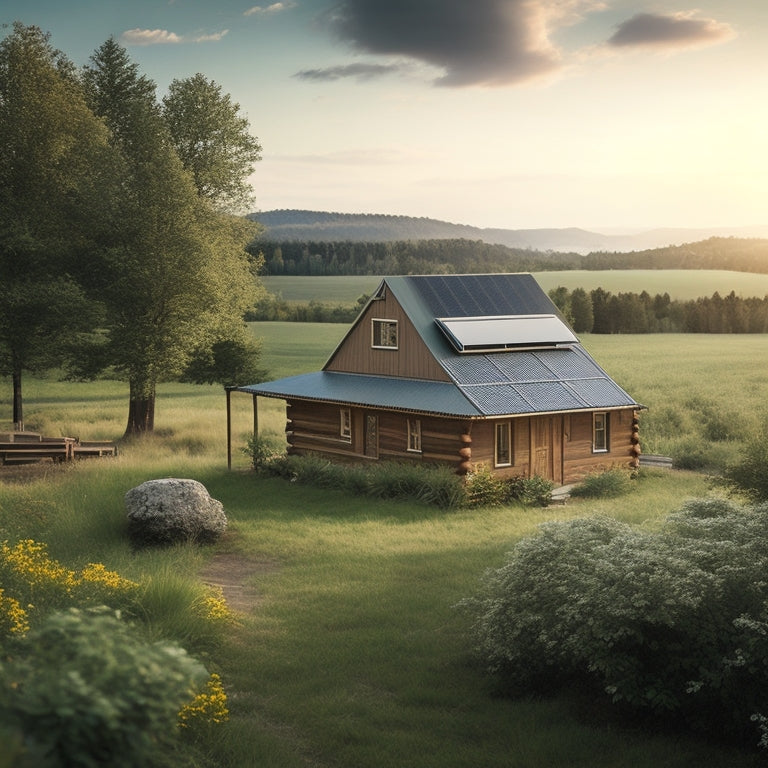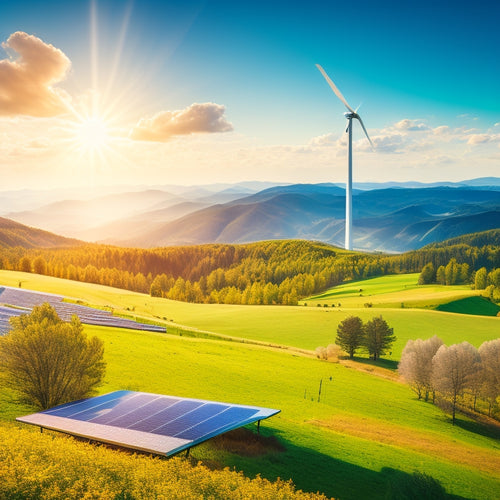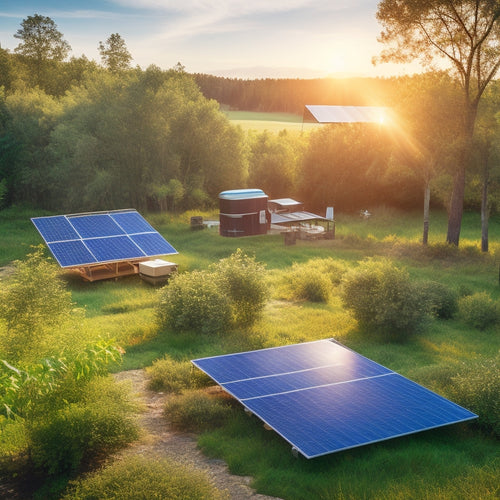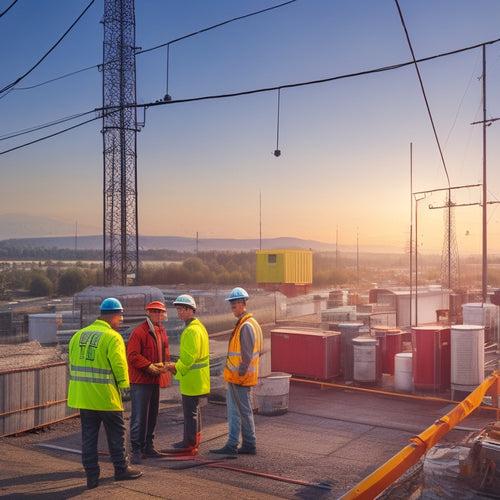
5 Best Off-Grid Solar Power Options for Rural Areas
Share
You're searching for the best off-grid solar power options for your rural home. Consider top-rated systems that prioritize high-efficiency solar panels, advanced monitoring capabilities, and reliable inverters. Energy storage systems are essential for a stable power supply; prioritize systems with grid resiliency and minimal maintenance. Cost-effective solutions can make off-grid power more accessible. To find the perfect system for your needs, you'll want to evaluate factors like system design, inverter sizing, and energy storage options. As you explore your options, you'll discover the perfect balance of performance, cost, and durability for your rural home - and the right solution is just ahead.
Key Takeaways
• Prioritize high-efficiency solar panels like monocrystalline or bifacial technology for maximum energy production in off-grid systems.
• Select a reliable inverter with high efficiency ratings above 95% for efficient energy conversion and consider factors like warranty and durability.
• Energy storage systems with grid resiliency and minimal maintenance are critical for a stable off-grid power supply in rural areas.
• Optimize system design and configuration to reduce costs, focusing on high-efficiency panels, right inverters, and layout for maximum savings.
• Consider cost-effective solutions with financial implications and solar financing options to make off-grid power accessible to rural communities.
Top-Rated Off-Grid Solar Systems
When choosing an off-grid solar system, you'll want to explore top-rated options that have proven themselves with regards to efficiency, durability, and reliability. Top-rated systems prioritize solar panel efficiency, ensuring maximum energy production from the available sunlight. Look for systems with high-efficiency panels, such as those with monocrystalline or bifacial technology, which can achieve efficiencies of up to 23%.
Additionally, consider systems with advanced system monitoring capabilities, allowing you to track performance, identify issues, and optimize energy production in real-time. This feature is essential for off-grid systems, where energy independence is paramount. Some top-rated systems also offer remote monitoring capabilities, enabling you to monitor and control your system from anywhere.
Solar Power for Remote Homes
Living off the grid in a remote home requires a reliable source of energy, and solar power offers a clean, sustainable solution to meet your electricity needs. As you navigate the challenges of rural living, solar power provides an independent and self-sufficient energy source, reducing your reliance on traditional grid power.
In rural areas, energy access can be limited, and traditional grid connections may be unavailable or unreliable. Solar power offers an attractive alternative, providing a consistent and reliable source of energy. The isolation benefits of rural living are undeniable, and solar power allows you to maintain your independence while still enjoying the comforts of modern living.
However, rural challenges such as harsh weather conditions, limited access to maintenance, and potential shading issues must be considered when designing and installing a solar power system. By understanding these challenges, you can optimize your solar power system to meet your specific needs, ensuring a reliable and efficient energy source for your remote home.
Best Off-Grid Inverters Available
You'll need a reliable inverter to convert the DC power generated by your solar panels into usable AC power, and selecting the right one is essential to ensuring a consistent energy supply in your off-grid home. When choosing an inverter, consider the size of your solar array and your energy needs.
Proper inverter sizing is vital to guarantee efficient energy conversion and minimize energy loss. Look for an inverter with a high efficiency rating, typically above 95%, to maximize your energy output.
Grid-forming inverters are a popular choice for off-grid systems as they can operate independently of the grid, providing a stable AC waveform. They can also synchronize with a generator or another inverter, allowing for a hybrid system.
Some top-rated off-grid inverters include the Schneider Electric Conext, the OutBack Power VFX, and the Magnum Energy MS-PAE. When selecting an inverter, consider factors such as warranty, durability, and customer support.
Energy Storage for Rural Areas
In rural areas, energy storage systems play a critical role in guaranteeing a stable and reliable off-grid power supply, especially during periods of low sunlight or prolonged grid outages. As you consider your energy storage options, prioritizing systems that provide grid resiliency and require minimal maintenance is crucial.
When selecting an energy storage system, consider the following key factors:
-
Battery Maintenance: Look for systems with automated monitoring and alert systems to guarantee timely battery maintenance, reducing the risk of unexpected downtime.
-
Battery Type: Choose from lead-acid, lithium-ion, or other battery types based on your specific energy needs and budget.
-
Scalability: Select a system that can be easily scaled up or down as your energy demands change over time.
- Integration: Ensure seamless integration with your existing solar power system and other off-grid components.
Cost-Effective Solar Solutions
Cost-effective solar solutions are essential for making off-grid power systems accessible to rural communities. They typically involve a combination of efficient panel configurations and smart system design. As you explore off-grid solar power options, it's important to take into account the financial implications. Solar financing options can help make these systems more affordable, allowing you to invest in a reliable source of energy.
With the cost of solar panels decreasing over the years, many rural areas have reached grid parity, where the cost of solar energy is comparable to, or even lower than, traditional grid electricity.
To achieve cost-effectiveness, you should focus on optimizing your system's design and configuration. This might involve using high-efficiency panels, selecting the right inverter, and optimizing your battery bank. Additionally, consider the overall system size and layout to minimize installation costs.
Frequently Asked Questions
Can I Use Off-Grid Solar Power for Agricultural or Farming Purposes?
You can definitely use off-grid solar power for agricultural or farming purposes, such as powering farm lighting, irrigation systems, and other essential equipment, increasing efficiency and reducing energy costs in your rural operation.
How Do I Protect My Off-Grid Solar System From Wildlife Damage?
To safeguard your off-grid solar system, you'll want to implement wildlife deterrents and animal-proofing measures, such as fencing, secure enclosures, and rodent-resistant wiring, to prevent damage from curious critters and hungry herbivores.
Can I Expand My Off-Grid Solar System as My Energy Needs Grow?
As your energy needs grow, you can expand your off-grid solar system through energy upgrades, leveraging system scalability to add more panels, batteries, or inverters, ensuring a smooth progression to increased power output.
Are Off-Grid Solar Systems Suitable for Areas With Frequent Cloud Cover?
You'll find that off-grid solar systems can still work in areas with frequent cloud cover, but you'll need to prioritize Cloudy Performance and invest in sufficient Energy Storage to guarantee a reliable supply of power when the sun isn't shining.
Do Off-Grid Solar Systems Require Regular Maintenance or Servicing?
You'll need to perform regular maintenance on your off-grid solar system, including battery monitoring, system inspections, and panel cleaning to guarantee peak performance; plus, fault detection and performance tracking to identify potential issues.
Related Posts
-

Renewable Energy Solutions to Reduce Your Carbon Footprint
To reduce your carbon footprint, adopting renewable energy solutions is key. Using solar panels or wind turbines can ...
-

Top Off Grid Solar Batteries for Renewable Energy
When seeking top off-grid solar batteries for renewable energy, consider options with advanced battery chemistry, suc...
-

Smart Grid Technology Implementation Challenges
You'll encounter several challenges when implementing smart grid technology, particularly in cost management, scalabi...


